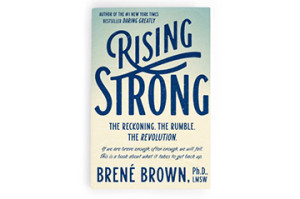By Rose O. Sherman, EdD, RN, FAAN
 My mother always told me that whatever does not kill you makes you stronger. She was often described as the woman with “incredible Irish grit”. She had a challenging life journey coming to the US as a young woman with little money and education. There were many obstacles placed in her path throughout her life yet she always seemed to rise strong even in her last months of life. Today, we would describe her as being very resilient. We all have the capacity to develop resiliency notes Brene Brown, author of the bestselling book, Rising Strong and nationally known speaker on this topic.
My mother always told me that whatever does not kill you makes you stronger. She was often described as the woman with “incredible Irish grit”. She had a challenging life journey coming to the US as a young woman with little money and education. There were many obstacles placed in her path throughout her life yet she always seemed to rise strong even in her last months of life. Today, we would describe her as being very resilient. We all have the capacity to develop resiliency notes Brene Brown, author of the bestselling book, Rising Strong and nationally known speaker on this topic.
What is Resiliency?
You have probably seen many examples in your life where people suffer an enormous setback but somehow bounce back. Psychologists call this resilience, or an ability to cope with problems and setbacks. Resilient people are able to utilize their skills and strengths to cope and recover from problems and challenges. This may include job loss, financial problems, illness, natural disasters, medical emergencies, divorce or the death of a loved one. Those who lack resilience might become overwhelmed by the same types of experiences. Brene Brown talks about three components in the process of developing resiliency. These include:
- Reckoning – this is understanding and recognizing the emotions that led to the setback.
- Rumble – this is taking the time to determine what is true in our story – what are we overlooking or exaggerating and what do you need to do to change?
- Revolution – this is taking what has happened to us and using it to emerge as a stronger person.
Building Leadership Resiliency
Resiliency is important if you want a long and productive leadership career. You will never be able to eliminate all the stress or erase life’s difficulties. But having resilience will give you the strength to tackle problems head-on, overcome adversity and move on with your life when difficulties occur. Resilient people view difficulty as a challenge, not as a paralyzing event. They look at their failures and mistakes as lessons to be learned from, and as opportunities for growth. They don’t view them as a negative reflection on their abilities or self-worth. Here are 10 tips from the experts that can help you to become more resilient in your leadership or personal life during tough times:
1. Build positive beliefs in your abilities and focus on your signature strengths.
2. Find a sense of purpose in your work and life every day.
3. Develop a strong supportive network of family, friends and professional colleagues.
4. Embrace change as inevitable and recognize what is in your control and what is not.
5. Stay optimistic in the face of dark periods in your life – believe that things will get better and brighter days are ahead.
6. Nurture yourself with the right foods, exercise, recreation, and sleep.
7. Develop your problem-solving skills to overcome challenges.
8. Establish small and achievable goals.
9. Practice thought awareness so you don’t get into a cycle of negative thoughts.
10. Maintain perspective – don’t blow a setback out of proportion – instead, learn from it.
Marty Seligman, a national expert on resilience, believes that the way that we explain setbacks to ourselves is the key to developing resilience. The reality is that we all fail from time to time, and everyone has crises in their lives. To develop resilience, you need to stop seeing yourself as a victim and be proactive in your own recovery. Ultimately, how we view adversity and stress strongly affects how we succeed. A resilient mindset is essential to successful leadership.
Read Rose Sherman’s new book available now – The Nurse Leader Coach: Become the Boss No One Wants to Leave
Read to Lead
Brown, B. (2015). Rising Strong. New York: Spiegel and Grau.
Cherry, K. (undated article – About.com Psychology). 10 ways to become more resilient.
Mindtools Website Developing resiliency: Overcoming and growing from setbacks
Wicks, R. (2009). Bounce: Living the resilient life. Oxford University Press.
© emergingrnleader.com 2019


 LinkedIn
LinkedIn Instagram
Instagram